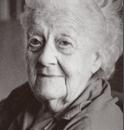Germaine Tillion

A great figure of the French Resistance, a writer, and an intellectual, Germaine Tillion is also considered one of the pioneers of French ethnology. Born on May 30, 1907 in Allègre (Haute-Loire) in a bourgeois, intellectual and catholic family, Germaine was early on interested in human sciences. In 1934, she was sent to Algeria as a young ethnographer in order to study the local Berber tribes. Upon her return to France in 1940, outraged by what had become of her countries, she joined the Resistance. Later, she would explain that the June 1940 armistice had been for her “a shock of such violence that I had to leave the room and vomit.” After meeting with a retired colonel, she became active in the National Union for Colonial Soldiers, providing assistance to colonial-born prisoners of war. Soon, she also began to work clandestinely, making an inventory of German prison camps, helping to create escape routes for prisoners, and collecting intelligence. She even began hiding refugees at her own home.
An early resistant, she worked with many different groups, including the resistance network at the Museum of Man. In the spring of 1941, she joined forces with other organizations, including Valmy, Those of the Resistance, the Gloria group, and France- Liberté. From then on, she became an essential part of the Resistance, helping groups communicate with one another. Betrayed by collaborator Robert Alesch, she was arrested on August 13, 1942 and sent to the Ravensbrück concentration cap some 13 months later on October 21, 1943. Her mother, also a resistant, joined her in the camp early in 1944, and was gassed there in March, 1945. In the seventeen months of her captivity, Germaine Tillion undertook a precise ethnographic analysis of the concentration camp. While still a captive at Ravensbrück, she also wrote “Verfügbar in Hell,” a short play meant to mock her tormentors and entertain her fellow prisoners – and yet another way for her to resist.
“I wrote comedy,” she later said, “because I thought that laughter, even in the most tragic of circumstances, is something that brings life.” She was finally freed on April 23, 1945, by the Swedish Red Cross, managing to leave the camp with photographs proving other prisoners at Ravensbrück had been the victims of vivisection.
From then on, Germaine Tillion dedicated her life to fellow survivors of the holocaust. She traced back the history of nearly 4,000 deported women and published in 1946 one of the very first eyewitness accounts of life in a concentration camp, Searching for the Truth. In the following years, she contributed to many trials of high-ranking Nazi officers (most notably at Hamburg and Rastatt, where the SS leaders managing Ravensbrück were judged) and prominent collaborators, including Vichy France’s chief of state, Maréchal Pétain.
In the mid-1950s, she agreed to return to Algeria on a mission to observe and analyze the situation on behalf of the French government. She concluded that the primary cause of the conflict was the pauperization of the local population, and tried to ease the situation with the launch of many initiatives aimed at helping the poor. In 1957, during the battle of Algiers, she held a secret meeting with National Liberation Front leader Yacef Saadi and successfully convinced him to temporarily stop indiscrimnately attacking civilians.
When the Algerian war ended, Germaine Tillion returned to teaching, but did not renounce her ideals. She was one of the first French intellectuals to denounce the use of torture by French forces in the country.
She died on April 19, 2008 at the age of 100.
She was an exceptional woman whose life was fueled by an inextinguishable drive for justice. She fought oppression and war, torture and injustice, poverty and social misery.
Despite living through some of the darkest hours of her century, Germaine Tillion never lost faith in humanity Peace, liberty and equality were the guiding principles of her life.
At the end of her life, she was a Grand-Croix of the Legion d’Honneur – the highest honor France can bestow upon a civilian, and had also received a Croix de Guerre 1939-1945 as well as the Medal of the Resistance and the Medal for Deported Resistants.
INA videos :
youtube link :
